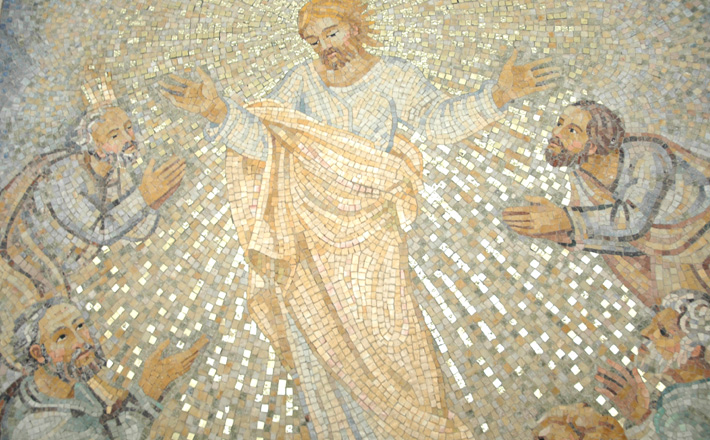Commentary on Exodus 24:12-18
What goes up, must come down.
The talk this week in the lectionary readings is about mountaintops — Moses on Mt Sinai, Jesus on a high mountain. A few years ago, I traveled with a group of seminarians to Israel and Palestine on a spiritual pilgrimage. The first day and half of the trip were spent along the Israeli coast admiring Caesar’s building programs. The group of seminarians was tolerating all these sites well, but I could tell that many of them were growing concerned that we had not yet seen any sites connected to Jesus.
Then, on that second afternoon we drove east finally toward the Galilee area and took our bus up a high mountain, Mount Arbel. After a short hike on foot to the very top of this mountain, we all froze suddenly in our tracks. There on the horizon was our first glimpse of the waters of the Sea of Galilee; there was Capernaum and the Mount of Beatitudes. Before us all were the very places where Jesus taught and healed. It was a profound spiritual experience for all of us; we had been preparing and reading for months about the Holy Land and now, in a moment, atop a mountain, it became alive.
Eventually we had to walk away and board our bus, of course, to come down the mountain to find our lodging along the sea. But our group remembered often our experience on Mount Arbel. Our collective silence and the sense of awe that filled each of us on that mountain were truly transformative for the group’s sense of community. It was a defining moment of the trip. But it was only one moment and didn’t last forever.
What goes up, must come down. The mountaintop experience is only one part of the story.
Moses knows something about mountaintop experiences. As the leader of the Israelites he is called up to Mount Sinai to receive the tablets of the law. Out there in the middle of nowhere surrounded by a great cloud for 6 days in the mountains, Moses saw the appearance of the glory of God. Devouring fire is how Exodus portrays the event.
Moses stays on the mountain for 40 days. It must have been a life-changing experience for this one who was so unsure of himself at his earlier call. The one who had brought his people up out of Egypt with God’s protection and provision, this one now finds himself atop a mountain, communing with God. Learning about God’s guidelines for the people.
But Moses can’t spend his whole life on a mountaintop. The people need him to lead them down below. They are, after all, in the wilderness! Moses must lead the Israelites onward to the Promised Land. No matter how important to Moses and to the Israelites Mt Sinai is, the place where God’s people receive the commandments. Mt Sinai is not the destination, the final stop. It is only one stop on the journey.
What goes up, must come down. The mountaintop experience is only one part of the story.
Jesus also knows a thing or two about mountains. For several weeks now we have heard some of his teachings as recorded in the Gospel of Matthew. And today we find Jesus going up another mountain, a high mountain, with three of his disciples.
The Gospel of Matthew does not spend too much time on what exactly happened to Jesus on the top of this mountain. He was “transfigured”. The Greek word there is where we get our biological term, metamorphosis. Jesus metamorphized; he changed form. And if a dazzling white figure is not enough of a spiritual event for Jesus and his disciples, Moses and Elijah appear as well. Moses, the great lawgiver, and Elijah, the representative of the prophets.
The whole event is so overwhelming for excited Peter that he opens his mouth, as he so often does, to blurt out the obvious, “It is good that we are here.” And to speak the unnecessary, “I will build a dwelling for each of you three.” Peter seems to want to stick around for a while, get comfortable, settle in, and have a nice talk with Jesus, Moses and Elijah. What an emotional and spiritual experience for those disciples!
Then, the last verse of the Matthew passage, rather calmly states that they went down the mountain. That Jesus and his three disciples eventually picked up their belongings and headed along to their next destination. They do not end up in dwellings with Elijah and Moses hanging around. Peter’s impulse to try to stay on the mountain ends up not being the right one.
What goes up, must come down. The mountaintop experience is only one part of the story.
Every mountaintop experience has this element of the story, the part where the people come down from the mountain and move forward with their lives. The part where people acknowledge that, while it is good for us to be on the mountain, it is also good for us not to stay, it is good to move on to other terrain, to the valleys and plains of life and perhaps to other mountains.
The spiritual life is one of mountains and hills and valleys and plains.
We may have moments in our lives of spiritual clarity where we sense God in a particularly powerful way. We may have moments when it doesn’t seem like life can get any better. But we should not expect our lives as followers of Jesus to always contain such clarity. For every mountaintop experience, we should also expect to return to normal moments, moments that are still important but do not contain the flashy lights and sounds.
What goes up, must come down. The mountaintop experience is only part of the story.


February 26, 2017